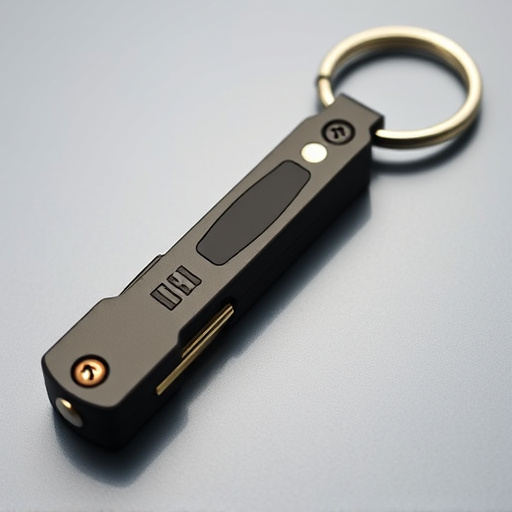Understanding Legal Self Defense Keychain Regulations is vital for US citizens considering carrying protective keyring devices, as each state has unique laws governing self-defense tools. While some states like Texas, Florida, and California allow open or concealed carry of compact self-defense weapons without permits, regulations vary greatly regarding age restrictions, prohibited locations, and permit requirements. Staying informed ensures compliance, personal safety, and responsible use, especially when traveling between states with differing Legal Self Defense Keychain Regulations.
“In today’s diverse legal landscape, understanding the regulations surrounding self-defense keychains is paramount for responsible citizens. This article delves into the intricate details of ‘Legal Self-Defense Keychain Regulations,’ exploring states with liberal laws allowing protective keyring devices. We’ll dissect legal considerations, limitations, and the benefits and concerns associated with carrying such tools. By examining these aspects, individuals can make informed decisions regarding personal safety.”
- Understanding Legal Self-Defense Keychain Regulations
- States with Liberal Laws Allowing Protective Keyring Devices
- Legal Considerations and Limitations
- Benefits and Concerns of Carrying a Keychain Defense Tool
Understanding Legal Self-Defense Keychain Regulations
Understanding Legal Self-Defense Keychain Regulations is paramount before considering carrying a protective keyring device. Each state in the US has its own set of laws governing the use and possession of self-defense tools, including keychains designed for protection. These regulations cover aspects such as permit requirements, prohibited areas, and the type of devices allowed, ensuring citizens are well-informed about their rights and responsibilities.
Knowing which states allow open carry or concealed carry of self-defense keychains is crucial. Some states have strict regulations, demanding permits for any self-defense weapon, while others may have more lenient rules. Additionally, understanding the legal implications of carrying a protective keyring, especially in public spaces like schools, government buildings, or airports, can help users stay within the law and avoid potential penalties.
States with Liberal Laws Allowing Protective Keyring Devices
Many states in the US have liberal laws regarding protective keyring devices, often referred to as self-defense keychains or personal safety tools. These regulations allow individuals to carry compact and discreet self-defense weapons, such as keyrings equipped with sharp blades or non-lethal force tools, without a permit or license. States like Texas, Florida, and California have specifically crafted laws that enable citizens to protect themselves in various situations, making these keyring devices a popular choice for personal safety.
The legal framework in these states typically classifies protective keyrings as legal self-defense weapons when carried for the purpose of protecting oneself, one’s property, or others from imminent harm. This flexibility in legislation has led to a rise in popularity for such devices, offering individuals an easy and accessible way to enhance their personal security without extensive legal red tape.
Legal Considerations and Limitations
The legality of carrying a protective keyring device for self-defense varies significantly across different states in the US. While many states allow open carry of certain types of weapons, including self-defense keychains, others have stringent regulations and restrictions. It’s crucial to understand these legal considerations before deciding on which state to travel or reside in, especially if you value your right to personal protection.
Keychain guns or protective keyrings are subject to federal laws and individual state regulations, encompassing such factors as age restrictions, permit requirements, and prohibited locations. Some states may require a permit for open carry, while others prohibit the use of self-defense weapons entirely in specific settings like schools, government buildings, or public events. As such, it’s essential to stay informed about local Legal Self Defense Keychain Regulations to ensure compliance and avoid any legal repercussions.
Benefits and Concerns of Carrying a Keychain Defense Tool
Carrying a legal self-defense keychain device offers several advantages for personal safety, especially in unpredictable situations. These compact tools can serve as a deterrent against potential threats, providing users with a sense of security while out and about. In many states with lenient regulations on legal self-defense keychain gadgets, individuals can easily and discreetly protect themselves without drawing attention. This is particularly appealing to those who prefer non-lethal means of self-defense or want to avoid escalating conflicts.
However, there are concerns surrounding the accessibility and potential misuse of such devices. Critics argue that making these tools widely available might encourage impulsive actions or lead to situations where they are used excessively or inappropriately. It is essential to remember that legal self-defense keychain regulations vary across states, and understanding local laws is crucial before carrying any self-defense device. Users must also be responsible and well-trained in the proper use of these tools to ensure effectiveness and minimize harm.
In conclusion, the legal landscape surrounding self-defense keychain devices varies greatly across states, offering some regions more freedom in carrying protective tools than others. Understanding these regulations is crucial for individuals considering legal self-defense keychain options. While these devices provide a sense of security and peace of mind for many, it’s important to be aware of potential limitations and restrictions to ensure compliance with local laws. Staying informed about the benefits and concerns associated with carrying a keychain defense tool can help folks make informed decisions regarding their personal safety.
